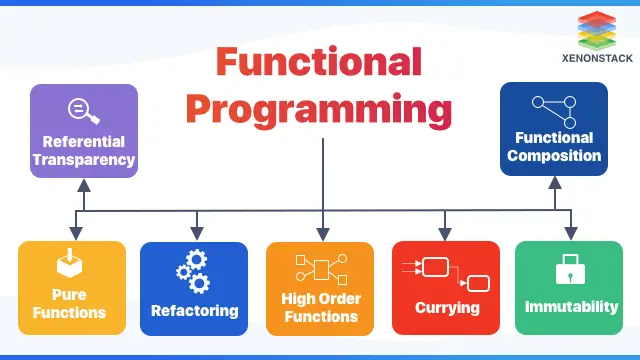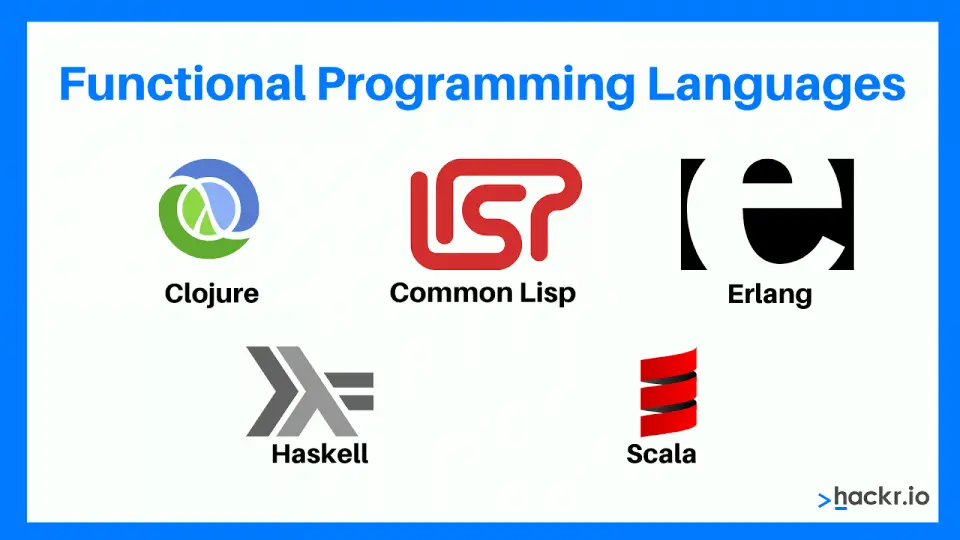Exploring Functional Programming: Concepts and Benefits

Introduction
Functional programming is a programming paradigm that emphasizes the use of pure functions, immutability, and recursion or iteration without side-effects. It differs from imperative programming, which relies heavily on state changes and side-effects. Functional programming offers numerous benefits, including improved code readability, maintainability, and testability.
Concepts

- Pure Functions: Pure functions always return the same output for a given input and do not modify any external state. This simplifies reasoning about code and makes it easier to debug.
- Immutability: Immutable data structures cannot be modified once created. This eliminates unexpected mutations, improves performance, and упрощает parallelization.
- Recursion vs. Iteration: Functional programming typically prefers recursion over iteration. Recursion can lead to shorter and more concise code, especially when dealing with complex data structures or algorithms.
Benefits

- Improved Code Readability: Pure functions and immutable data structures make code more clear and straightforward, as there are no hidden side-effects or unexpected state changes.
- Enhanced Maintenability: The immutability of data structures prevents accidental modifications, leading to fewer bugs and a more stable codebase.
- Increased Testability: Pure functions are easier to test since they can be isolated and tested without the influence of external state.
- Concurrency: Functional programming naturally lends itself to concurrency, as pure functions are inherently thread-safe and can be safely executed in parallel.
- Scalability: Functional programming techniques, such as immutability and recursion, contribute to improved scalability through simplified code, reduced state management, and improved concurrency.
Applications
Functional programming is widely used in various fields, including:
- Data processing and analysis
- Machine learning and data science
- Reactive programming and event handling
- Web development and user interfaces
- Cloud computing and distributed systems
Conclusion
Functional programming offers a powerful paradigm that promotes code clarity, maintainability, testability, and concurrency. By embracing its principles, developers can create more robust, flexible, and scalable applications. As computing evolves, functional programming is poised to play an increasingly important role in shaping the future of software development.## Exploring Functional Programming: Concepts And Benefits
Executive Summary
Functional programming is a programming paradigm that emphasises the use of pure functions and immutability, leading to code that is more concise, easier to understand, and less prone to errors. It offers significant benefits for various applications, including improved code quality, better testability, and enhanced concurrency support. This article provides a comprehensive overview of functional programming, its core concepts and how they contribute to the advantages it offers.
Introduction
Functional programming has gained increasing attention in recent years as a powerful approach to software development. It departs from traditional imperative programming styles, favouring a more declarative and mathematical approach. By leveraging concepts such as pure functions and immutable data structures, functional programming aims to enhance code clarity, reduce side effects, and promote safer and more reliable software systems.
Core Concepts of Functional Programming
Pure Functions:
Pure functions produce the same output for given inputs, regardless of the state of the program or external factors. They have no side effects and do not mutate their arguments, making them predictable and easy to reason about.
Immutability:
Functional programming encourages immutability, where data structures cannot be modified once created. This ensures that the state of the program remains consistent throughout its execution, eliminating potential sources of errors and unexpected behaviour.
First-Class Functions:
In functional programming, functions are treated as first-class citizens, meaning they can be assigned to variables, passed as arguments, and returned from other functions. This enables the creation of higher-order functions that operate on other functions, enhancing code reusability and modularity.
Pattern Matching:
Pattern matching allows for concise and expressive code by deconstructing data structures based on their patterns. It offers a more declarative approach to handling different cases or scenarios, reducing the need for conditional statements and switch-case blocks.
Recursion:
Functional programming embraces recursion as a powerful tool for solving problems. Recursive functions call themselves repeatedly to break down a problem into smaller subproblems, leading to elegant and reusable code.
Benefits of Functional Programming
Improved Code Quality:
The emphasis on pure functions and immutability reduces unintended side effects and enhances code clarity. Functional programming promotes a more deterministic and predictable codebase, minimising unexpected behaviour and runtime errors.
Enhanced Testability:
Pure functions make testing simpler and more reliable. Their predictable behaviour allows developers to easily test individual functions in isolation, reducing the effort and time required for thorough testing.
Concurrency Support:
Functional programming’s focus on immutability and lack of shared state make it well-suited for concurrent programming. By eliminating the need for synchronisation primitives, it simplifies the development of highly concurrent applications that can efficiently leverage multiple cores and processors.
Modularity and Reusability:
First-class functions and higher-order functions promote code modularity by enabling the creation of reusable and composable components. This enhances code maintainability and reduces development time.
Reduced Complexity:
By embracing declarative programming and eliminating side effects, functional programming simplifies complex codebases. It improves comprehension, reduces cognitive load, and makes it easier for developers to understand and maintain the system.
Conclusion
Functional programming offers a powerful paradigm for modern software development. Its focus on pure functions, immutability, and declarative programming leads to code that is more concise, easier to understand, and less prone to errors. It provides significant benefits for improving code quality, testability, concurrency support, modularity, and overall complexity reduction. Embracing functional programming principles can empower developers to create more robust, maintainable, and scalable software systems.
Keyword Tags
- Functional programming
- Pure functions
- Immutability
- Declarative programming
- Concurrency
FAQ
-
What is the primary advantage of using pure functions in functional programming?
- Predictability and reduced side effects, leading to more reliable and maintainable code.
-
How does immutability contribute to functional programming?
- It ensures consistent program state, eliminates potential errors caused by mutation, and simplifies reasoning about code behaviour.
-
Why is pattern matching considered a significant concept in functional programming?
- It provides a concise and expressive way to handle different cases or data patterns, reducing the need for conditional statements.
-
How does functional programming enhance concurrency support?
- Its emphasis on immutability and lack of shared state simplifies concurrent programming, eliminating the need for synchronisation primitives.
-
In what ways does functional programming contribute to modularity and reusability?
- First-class functions and higher-order functions allow the creation of reusable and composable components, enhancing code maintainability and reducing development time.

Functional programming is a great way to write more declarative and easier-to-understand code. I’ve been using it for a few years now and I’ve found it to be a very productive way to develop software.
This article does a great job of explaining the basics of functional programming. I found it to be very helpful in understanding the concepts.
I’m not sure I agree with the author’s claim that functional programming is always more efficient than imperative programming. In some cases, imperative programming can be more efficient, especially when dealing with large data sets.
Functional programming is all the rage these days, but I don’t see the point. It’s just a bunch of academic jargon that makes code harder to read.
Functional programming is the future of software development. It’s the only way to write code that is truly reliable and maintainable.
I’ve been trying to learn functional programming for years, but I just can’t seem to get the hang of it. It’s like trying to learn a foreign language.
Functional programming, powerful it is. Clarity and simplicity, it brings.
D’oh! Functional programming? That’s for nerds.
Functional programming is like a box of chocolates. You never know what you’re gonna get.
Elementary, my dear Watson. Functional programming is the only logical way to write code.
Functional programming is the path to the dark side. It leads to pain and suffering.
Functional programming is like a box of chocolates. You never know what you’re gonna get.
Elementary, my dear Watson. Functional programming is the only logical way to write code.
Functional programming is the path to the dark side. It leads to pain and suffering.
Functional programming? What’s that? Is it something you eat?
Functional programming is like a muscle. The more you use it, the stronger it gets.